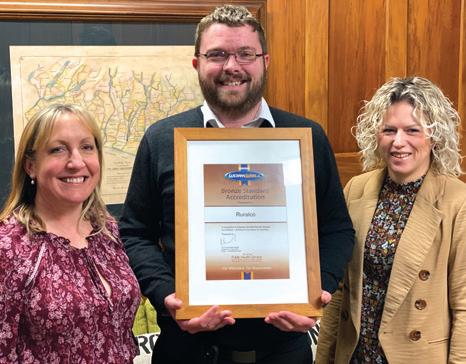
3 minute read
Ruralco sponsorship helps ground-breaking researcher
by Ruralco
Covid 19’s upset of plans for Lincoln University to host the “grazing in future multi-scapes” conference last December has had a silver lining for the Lincoln University PhD student Konagh Garrett.
Advertisement
WORDS BY RICHARD RENNIE, IMAGE SUPPLIED
After the conference was forced to be indefinitely postponed due to covid, Ruralco instead directed its sponsorship towards supporting a young academic scholarship aligned with the conference’s objectives. These were to identify future models of pastoralism, with input from some of agriculture’s leading thinkers, identifying what pastoral systems of the future will look like. Konagh was the fortunate recipient of the Ruralco sponsorship grant, receiving the funding to help her maintain research momentum in her work after winding up her final months of study for a Doctorate of Philosophy in Animal Science at Lincoln University. Konagh’s work at Lincoln is based on a hypothesis that has proven to be as true for animals as it is for humans. That is that animals exposed to dietary diversity and variety will have improved welfare and production outcomes as well as delivering a lower environmental footprint. The focus of her work has been on grazeable forages that are commonly grown on New Zealand dry-stock finishing farms. She has studied feeding ewes and lambs diets of lucerne, plantain, rye and chicory offered either as mixed pasture diets, or fed separately at different times of the day, and compared production outcomes to those fed on conventional ryegrass pasture diets. At a time when New Zealand farmers are being forced to review grazing systems in order to reduce nitrate losses, respond to climate change challenges, and seek out ways to break the production ceiling imposed by conventional pasture mixes, her work is proving timely. Perhaps surprisingly for a predominately pasture based economy, Konagh found not a great deal of work had been done in this area, and her results have provided some valuable insights to what future pasture systems may look like. “While a bit of work had been done, my work looked at how the feed was presented to the animal, either in a pasture mix, or separately, and compared that to conventional ryegrass.” Offering lambs the four separate components of feed type (rye/lucerne/ chicory/plantain) resulted in 20% greater dry matter intake than conventional pasture, and 10% greater than when those varieties were offered in a pasture mix. Weight gains when finished on lucerne alone were 227g a day, on all four in a mixture it was 296g a day, but when offered all four separately throughout the day it was 378g a day. “We would feed them rye and plantain in the morning, and then the chicory and lucerne in the afternoon.” She and her fellow researchers have some theories around why the separate offerings delivered better gains. One is that like humans, animals can tire of the same offering every day, even when it comprises a mixture and separate offerings in sequence providing a more novel and appealing diet to them. Her work has also revealed some strong links between ewe diet and lamb production, work that parallels the world leading transgenerational dietary research work conducted by Sir Peter Gluckman on humans. Konagh’s work has found promising results that provide evidence supporting improved production and welfare and reduced environmental impact form those animals offered a diverse diet, compared to those on conventional diets. Konagh grew up in the eastern Waikato town of Waihi, and says she was always interested in the rural environment around her, despite not being off a farm. After completing her Bachelor and Masters of Science Research at University of Waikato she completed an internship at DairyNZ before moving to Lincoln to complete her PhD. She has a clear goal of becoming a world class research scientist, specialising in ruminant nutritional ecology. While she is only just completing her PhD work, her research has already achieved wide cut through in the scientific world, with 10 scientific publications in peer reviewed journals, and interviews on national media. “Being awarded the Ruralco sponsorship is hugely welcome. It means now my funding has ended for my PhD work, I can spend the time while my PhD is being graded to analyse the additional data from my PhD that I will not have time or funds to include in it,” she says.










